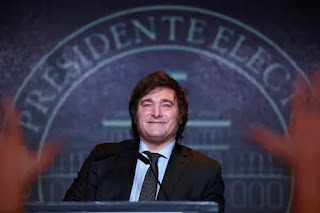Argentina in Dire Straits
Photo source: Foreign Affairs
By Naveed Qazi | Editor, Globe Upfront
When Javier Milei became Argentina’s president in December 2023, he would not be the first of the country’s leaders to come to power by boldly promising an end to stagnation. For decades, new leaders, left and right, have entered office with radical reform programs meant to mark a sharp break with the past. None of them has had more than temporary success in breaking the country out of myriad illnesses that have characterised most of its modern history.
Argentines elected Milei, a libertarian outsider who entered politics only two years ago. It is because they were fed up after years of economic instability. But his electoral campaign was dominated not just by the catastrophic state of the economy but also by Milei’s eccentricities. An admirer of former presidents Donald Trump of the United States and Jair Bolsonaro of Brazil, he promised to bring down public spending, shut down Argentina’s central bank, and adopt the US dollar as the national currency to tame inflation. Some of his more controversial statements included proposing to legalise the sale of children and human organs and calling Pope Francis a ‘filthy leftist.’
Milei won partly because he seemed authentic to his voters. Someone with less political experience than him, he embodied the rage many Argentines feel against the status quo. He proved particularly popular among young voters, who enjoyed his outbursts on social media and saw him as a fresh start. He castigated the ‘political caste’ and signaled his intent to drastically reduce the size of the state. His targets included not just Kirchnerismo, the left-wing Peronist faction that has dominated Argentine politics since 2003, but also the center-right coalition Juntos por el Cambio (JxC) that ruled between 2015 and 2019 under former President Mauricio Macri.
After Milei’s triumph in his internal leadership contest amid his party, he agreed and promised ‘shock therapy’ as opposed to the ‘gradualism’ that defined Macri’s reforms.
As Milei assumes office, the challenges confronting him are enormous. To succeed and break the cycle of decline and instability the country has been trapped in for decades, Milei will need not just the hardiness he showed during his improbable rise to power but also a willingness to compromise, avoid unnecessary fights, and learn from past attempts at reform. The path to real change may be even narrower than he thinks.
Milei’s first task is to put together a competent administration and build political support for his reforms. Ensuring governability will not be easy. Milei’s party, La Libertad Avanza, lacks experience and knowledge about the workings of the state they will try to reform. Macri’s support will be important, as he can offer more seats in Congress and experienced former officials. In fact, some of Milei’s potential ministers have served under Macri, including Bullrich, who could return as security minister, and Luis Caputo, who was announced as Milei’s new economy minister after other candidates for the job fell through.
Milei will also need to reach out to Peronists, whose party will do some soul-searching after a chaotic time in power and a painful electoral defeat. He might find support among some Peronist provincial governors, who are often pragmatic and control many seats in Congress. To achieve this, however, Milei will need to water down some of his more radical proposals, such as eliminating all public works projects, and offer federal assistance to replenish depleted provincial coffers. He will also need to preserve his autonomy from Macri, who is scorned by most Peronists. Indeed, Macri’s influence might be a double-edged sword for Milei. The former president is quite unpopular, having lost re-election in 2019 amid a serious economic crisis that continues to this day. He had promised to implement pro-market policies to boost growth and reduce inflation, but he achieved neither aim, despite incurring $44 billion in International Monetary Fund debt that Argentina is struggling to repay. In a Foreign Affairs Oped by Bruno Benetti: ‘Milei needs Macri, but if Macri proves too influential, those who voted for Milei to get rid of the establishment will feel betrayed.’
The need for pragmatism should talk about what Argentines politically endear the most: the economy. A self-described anarcho-capitalist who has almost absolute confidence in free markets, Milei must accept that he was elected to solve Argentina’s problems, not use his country as the subject of an ideological experiment. The economic situation is dire and speaks for itself. Central bank reserves have plummeted, and the peso’s value has crumbled against the dollar, fueling inflation that reached one hundred forty percent in October 2023 and continues to rise. The economy, which will contract this year, has been stagnant since 2012, pushing more than forty percent of the population into poverty.
One thing to note is that Milei has backtracked on key proposals such as complete dollarisation and shutting down Argentina’s central bank, which worked as campaign slogans but had been questioned for their applicability and disruptive implications. An attempt to peg the Argentine peso to the US dollar in the 1990s stopped inflation but collapsed amid a serious socioeconomic crisis in 2001. Bruno Benetti further wrote: 'Milei should avoid the temptation of taking such shortcuts and instead do what other Latin American countries did to control inflation: strengthen central bank independence, limit fiscal deficits, and avoid financing the Treasury by printing money. This recipe will take time to work, but the results will be more sustainable.'




Comments
Post a Comment
Advice from the Editor: Please refrain from slander, defamation or any kind of libel in the comments section.